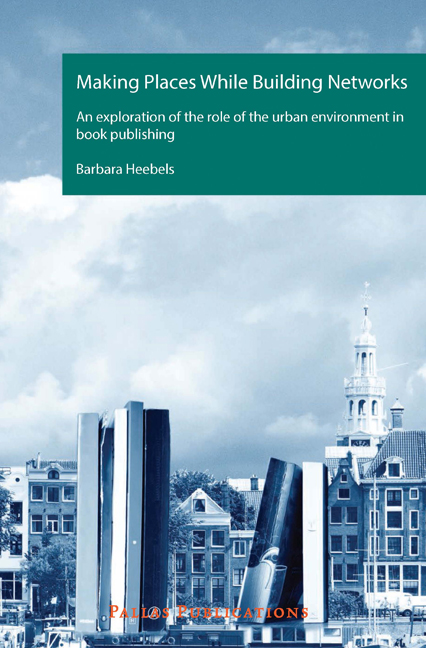Book contents
- Frontmatter
- Dedication
- Contents
- 1 Introduction
- 2 Creative Clusters in Berlin: Entrepreneurship and the Quality of Place in Prenzlauer Berg and Kreuzberg
- 3 Performing in Dutch Book Publishing 1880–2008: the Importance of Entrepreneurial Experience and the Amsterdam Cluster
- 4 Place-making from Publishing house to Book Fair: Dutch Book Publishers and the Role of Place in Establishing Trust and Reputation
- 5 Social Networks and Cultural Intermediaries: the Multiplexity of Personal Ties in Publishing
- 6 Conclusions
- References
- Appendix A Descriptive Statistics & Correlations
- Appendix B Characteristics of Interviewees
- Nederlandse Samenvatting
2 - Creative Clusters in Berlin: Entrepreneurship and the Quality of Place in Prenzlauer Berg and Kreuzberg
Published online by Cambridge University Press: 20 January 2021
- Frontmatter
- Dedication
- Contents
- 1 Introduction
- 2 Creative Clusters in Berlin: Entrepreneurship and the Quality of Place in Prenzlauer Berg and Kreuzberg
- 3 Performing in Dutch Book Publishing 1880–2008: the Importance of Entrepreneurial Experience and the Amsterdam Cluster
- 4 Place-making from Publishing house to Book Fair: Dutch Book Publishers and the Role of Place in Establishing Trust and Reputation
- 5 Social Networks and Cultural Intermediaries: the Multiplexity of Personal Ties in Publishing
- 6 Conclusions
- References
- Appendix A Descriptive Statistics & Correlations
- Appendix B Characteristics of Interviewees
- Nederlandse Samenvatting
Summary
Abstract
Urban creative clusters are currently a major focus of attention, as their prominent position in both local political and academic circles makes evident. Many authors stress the importance of spatial concentration for creative industries. However, only a few studies have focused on the individual entrepreneur. As a result, empirical evidence of the meaning of urban place as a site for social networks and a space for inspiration is still scarce. This is of some consequence as entrepreneurs provide a crucial link between creative activities and economic change and development. This study contributes to the existing literature by investigating how different creative entrepreneurs choose and evaluate their location. Using qualitative interviews with entrepreneurs in two creative clusters in the Berlin neighbourhoods Prenzlauer Berg and Kreuzberg, this article shows the significance of the look and feel of specific places and explains how and for whom local networks are important.
Introduction
Creative industries are becoming more important in advanced urban economies (Scott, 2000; Kloosterman, 2004). These are industries that produce products and services with a high symbolic and aesthetic content. Such products and services respond to consumer demand for creating experiences for individual expression and lifestyles (e.g. Caves, 2000; Scott, 2000; Hartley, 2005). The outputs are valued for their aesthetic rather than solely utilitarian functions (Scott, 2000). Three major domains can be distinguished: media/entertainment, creative commercial services, and the arts (Manshanden et al., 2004). As their prominent position on both local political and academic agendas demonstrates, clusters of creative industries are currently a major focus of attention. They have an important role in urban economic development policies (Hall 2000; Scott, 2006), which aim to brand the city as a whole and/or to boost particular neighbourhoods as creative destinations. Old industrial areas often find a new function as creative clusters either through specific cluster policies or through more autonomous processes. This provides these areas with a new vitality, but also evokes new fields of tension between art and commerce and between economic development and inclusion and social welfare. In relation to the latter, the current focus on stimulating creativity and creative clusters is criticized for being elitist and exclusionary (e.g. Peck, 2005).
- Type
- Chapter
- Information
- Making Places While Building Networks An exploration of the role of the urban environment in book publishing , pp. 27 - 54Publisher: Amsterdam University PressPrint publication year: 2012



